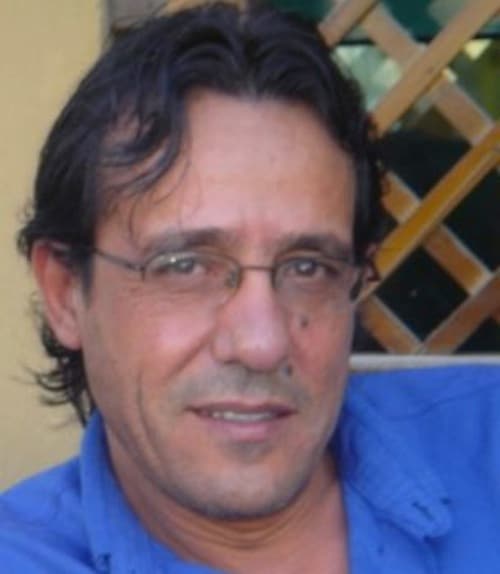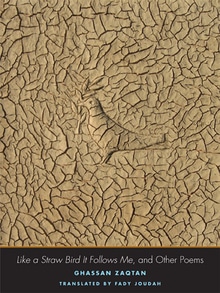
Palestinian poet Ghassan Zaqtan is a novelist, editor, and the author of ten collections of poetry. He was born in Beit Jala, near Bethlehem, and has lived in Jordan, Beirut, Damascus, and Tunis. He returned to Palestine in 1994 and now lives in Ramallah.

Judges’ Citation
His poetry awakens the spirits buried deep in the garden, in our hearts, in the past, present and future. His singing reminds us why we live and how, in the midst of war, despair, global changes.
What does poetry do? Nothing and everything, like air, water, soil, like birds, fish, trees, like love, spirit, our daily words … It lives with us, in and outside us, everywhere, all the time, and yet, we are too often oblivious of this gift. It’s a poet’s job to bring this gift out and back, this gift that makes us human again. And Mr. Zaqtan has done it. His poetry awakens the spirits buried deep in the garden, in our hearts, in the past, present and future. His singing reminds us why we live and how, in the midst of war, despair, global changes. His words turn dark into light, hatred into love, death into life. His magic leads us to the clearing where hope becomes possible, where healing begins across individuals, countries, races … and we are one with air, water, soil, birds, fish, trees … our daily words pregnant with beauty, and we begin to sing again till ‘ … the singer / and the song / are alike (Biography in Charcoal)’. This is Mr. Zaqtan’s only ‘profession’. It’s now also ours. About the translation: as a translator of poetry myself, I know the danger, frustration and the joy in the process of catching the fire from the original and delivering it through/into another language, another culture, another sentiment. Mr. Joudah delivered with such grace and power. My salute to Mr. Joudah, as translator to translator, as poet to poet, as doctor to doctor.
Selected poems
by Ghassan Zaqtan
In Jabal Najmeh, by the woods, the wizard will stop me
by a passage for boats with black masts
where the dead sit before dawn in black garments and straw masks,
a passage for the birds
where white fog swims and gates open in the brush
and where someone is talking down the slope
and bells are heard and the rustles of flapping wings
resemble the forest passing over the mountain and nicking the night!
… and peasants, fishermen and hunters, and awestruck soldiers, Moabite,
Assyrian, Kurd, Mamluk, Hebraic with claims
from Egypt, Egyptians on golden chariots, nations
from white islands, Persians with black turbans,
and idolater-philosophers bending the reeds
and Sufis seeking the root of ailment…
the flapping of wings drags the forest toward the edges of darkness!
In Jabal Najmeh, by the woods
where the absentee’s prayer spreads piety’s rugs
and the canyon is seen through to its limits,
the furrowed sea scent cautiously passes by
and the cracks are like a jinn’s harvest
and the monks’ pleas glisten
as I glimpse the ghosts of lepers sleeping on decrepit cypress
In Jabal Najmeh, by the woods,
I will hear a familiar old voice,
my father’s voice throwing dice toward me
Or Malek’s voice
as he tows a blond horse behind him in his elegy
Or the voice of Hussein Barghouthi
laid to rest beneath almond trees
as he instructed in the text
And my voice:
You’re not alone in the wilderness!
Copyright © 2012 by Fady Joudah, translated from the Arabic written by Ghassan Zaqtan, Like a Straw Bird It Follows Me, Yale University Press
You’re Not Alone in the Wilderness
the Arabic written by Ghassan Zaqtan
Don’t open the window
don’t wake up
I beg you don’t wake up …
they were dancing on the garden grass
as if they were the garden’s motive
or its meditation
and they were screaming there
Beneath the light
their dust was coming apart
it had rained at night
all night.
Copyright © 2012 by Fady Joudah, translated from the Arabic written by Ghassan Zaqtan, Like a Straw Bird It Follows Me, Yale University Press
The Dead in the Garden
the Arabic written by Ghassan Zaqtan
The enemy’s dead think mercilessly of me in their eternal sleep
while ghosts take to the stairs and house corners
the ghosts that I picked off the road and gathered like necklaces
from others’ necks and sins.
Sin goes to the neck… there I raise my ghosts, feed them
and they swim like black horses in my sleep.
With the energy of a dead person the last blues song rises
while I think of jealousy
the door is a slit open and breath enters through the cracks, the river’s
respiration, the drunks
and the woman who wakes to her past in the public garden
and when I fall asleep
I find a horse grazing grass
whenever I fall asleep
a horse comes to graze my dreams.
On my desk in Ramallah there are unfinished letters and photos of
old friends,
a poetry manuscript of a young man from Gaza, a sand hourglass,
and poem beginnings that flap like wings in my head.
I want to memorize you like that song in elementary school
the one I carry whole without errors
with my lisp and tilted head and dissonance
the little feet that stomp the concrete ground with fervor
the open hands that bang on the desks
All died in war, my friends and classmates…
and their little feet, their excited hands, remained
stomping the classroom floors, the dining tables and sidewalks,
The backs and shoulders of pedestrians…
Wherever I go
I hear them
I see them.
Copyright © 2012 by Fady Joudah, translated from the Arabic written by Ghassan Zaqtan, Like a Straw Bird It Follows Me, Yale University Press
Black Horses
the Arabic written by Ghassan Zaqtan